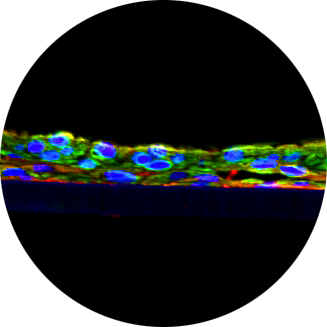REAWAKENING RETROCYCLINS: ANCESTRAL HUMAN DEFENSINS ACTIVE AGAINST HIV-1. (REPORT).
- TR Number: 540
- Authors: Venkataraman, N., Cole, A.L., Ruchala, P., Waring, A.J., Lehrer, R.I., Stuchlik, O., Pohl, J. and Cole, A.M. University of Massachusetts, Amherst, MA.
- Materials Tested: Aminoglycosides, Anti-retrocyclin antibody, HIV-1, Human defensins, Tobramycin
This study by researchers at the University of Massachusetts showed that Mattek’s EpiVaginal in vitro 3-D human cervico-vaginal tissue equivalent can be used to demonstrate the ability to restore endogenous expression of retrocyclin peptides. Human alpha and beta defensins contribute substantially to innate immune defenses against microbial and viral infections. Certain nonhuman primates also produce theta-defensins — 18 residue cyclic peptides that act as HIV-1 entry inhibitors. Multiple human theta-defensin genes exist, but they harbor a premature termination codon that blocks translation. Consequently, the theta-defensins (retro-cyclins) encoded within the human genome are not expressed as peptides. In vivo production of theta-defensins in rhesus macaques involves the post-translational ligation of two nonapeptides, each derived from a 12-residue “demidefensin” precursor. Neither the mechanism of this unique process nor its existence in human cells is known. To ascertain if human cells retained the ability to process demi-defensins, we transfected human promyelocytic cells with plasmids containing repaired retrocyclin-like genes. The expected peptides were isolated, their sequences were verified by mass spectrometric analyses, and their anti-HIV-1 activity was confirmed in vitro. This study reveals for the first time, to the researchers knowledge, that human cells have the ability to make cyclic theta-defensins. Given this evidence that human cells could make theta-defensins, we attempted to restore endogenous expression of retrocyclin peptides. Since human theta-defensin genes are transcribed, we used aminoglycosides to read-through the premature termination codon found in the mRNA transcripts. This treatment induced the production of intact, bioactive retrocyclin-1 peptide by human epithelial cells and cervicovaginal (EpiVaginal) tissues. The ability to reawaken retrocyclin genes from their 7 million years of slumber using aminoglycosides could provide a novel way to secure enhanced resistance to HIV-1 infection.

